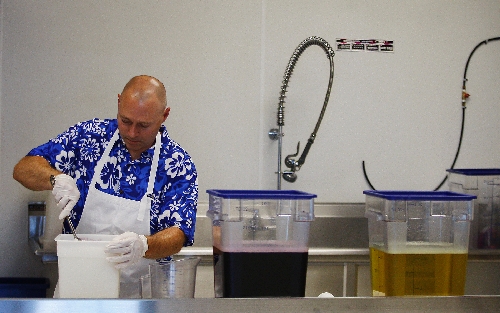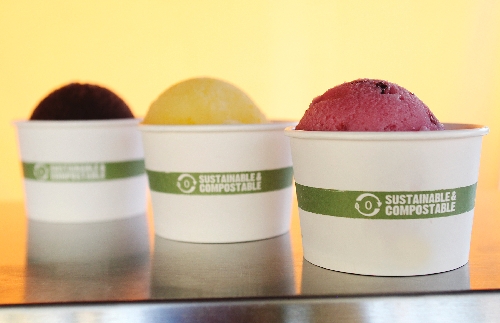Tiki Ice goes from Governor’s Cup to growing startup
Jean Bridges and Robert Bateman didn't come up with a high-tech, costly business model to impress the judges when they competed in the 2010 Donald W. Reynolds Governor's Cup.
To compete in the business plan competition for college students, the future entrepreneurs instead developed a plan to make all-natural Italian ices in colorful packaging and sell the healthy treats at a small stand.
They also came up with a catchy name: Tiki Ice.
The simplicity of their business model made Tiki Ice turnkey ready. Last summer the partners opened a stand in the popular Town Square shopping center. And in March they started selling packaged Tiki Ice in Southern Nevada Whole Foods Markets.
Next fall, the startup company will go big with distribution in hundreds of grocery stores across the Southwest.
"Albertsons just gave us the OK," Bateman said Thursday. "They said it will probably be in around 250 stores."
The company, having brought in just $35,000 in revenue in its first 11 months, has just seven employees, including the partners. It now produces about 150 cases of Tiki Ice per month for Whole Foods in a leased, 1,145-square-foot commercial kitchen.
The expansion will take some adjustment and mean hiring a bigger work force.
"We are looking at outsourcing production. We are talking to some people," Bridges said Thursday, just hours after receiving final approval from Albertsons.
Bateman had grown up around his uncle's Italian ice shop in Pittsburgh, and the partners, both 40, began kicking around the idea for all-natural frozen treats when they were students at Arizona State University in 1989.
But after graduation, Bateman instead worked for 15 years in graphic design and production in Southern California. Bridges finished her undergraduate degree at the University of Nevada, Las Vegas and worked in finance and accounting before going back for a master's of business administration.
The two kept in touch, though, and Bridges never forgot the all-natural Italian ice concept. When she started looking for ideas for the business plan competition, she sought Bateman's help.
"As we went forward with the business plan, we realized we had something that could be a real business, not just a student plan," Bridges said.
Bateman moved to Las Vegas in 2010 to help expand the new company.
"We thought of franchising, but we discovered distribution through grocery stores was more lucrative," Bateman said. "And it gives us more control."
While Bateman now carries the title of president and CEO, he's most often found in an apron or Hawaiian shirt than a Brooks Bros. suit. He works in Tiki Ice's kitchen, adding fruit, blending and mixing the flavors.
The most popular Tiki Ice flavors are mixed berry, piña colada, mango and lemon lime. A pint of Tiki Ice sells for about $5.99 at Whole Foods, which Bridges calls a midrange price among her competitors.
Despite the recession, the U.S. market for ice cream and related frozen desserts increased 2 percent to reach $25 billion in 2009, according to market researcher Packaged Fact.
Tiki Ice's main ingredients -- fresh fruits, natural sugar and ice -- set the product apart from many other frozen treats. It's also free of gluten and hydrogenated corn syrup.
"We found that a lot of parents bring their children because they have gluten or dairy allergies, but can still have Tiki Ice," Bridges said. "A lot of kids have allergies now."
The duo started business with $5,000 in Governors Cup prize money and about $55,000 in startup capital from family members.
The shoestring startup's success doesn't surprise Dave Archer, the president and CEO of Nevada's Center for Entrepreneurship and Technology.
"Fairly modest funding levels are the trends (for current Governor's Cup winners)," Archer said. "There's a growing recognition that these business models can be very successful and very lucrative."
Bateman and Bridges have gone back to their families for an additional $20,000 to help cover labeling and marketing costs associated with distribution. They're also seeking more financing, but don't want to take the company public.
Bridges said she's learned that it's best to get the minimum startup money and to build the business over time.
"Find a product people want," she said, "and once you get orders and sales, people will want to invest in your company."
Contact reporter Valerie Miller at
vmiller@lvbusinesspress.com or 702-387-5286
























